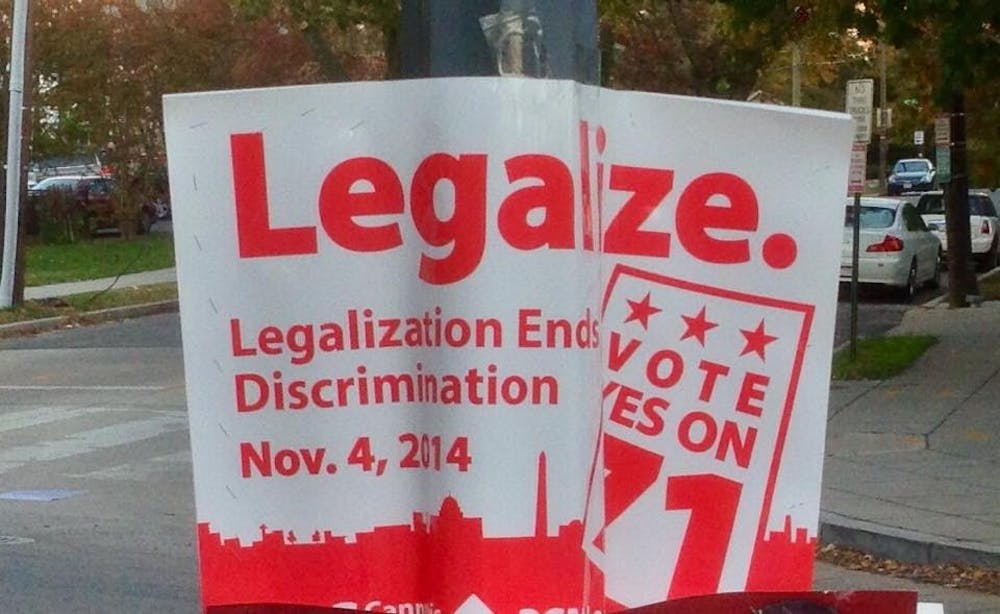D.C. might join Colorado and Washington in legalizing marijuana when voters decide the fate of Initiative 71 on Nov. 4, the ballot measure to legalize possession and cultivation of small amounts of marijuana.
The measure came to public attention only in April, when the D.C. Board of Elections allowed the DC Cannabis Campaign to begin collecting signatures for the measure to be on November’s general election ballot. The campaign turned in more than double the required signature count — nearly 57,000 — by July 7 to place the measure on the ballot.
The new law would make it legal for a 21 year old to possess up to two ounces of marijuana for personal use, grow the plant and use or sell drug paraphernalia. The measure would not legalize the sale of marijuana.
Prospects of the measure passing are high. According to a September NBC4/Washington Post/Marist poll, 65 percent of likely voters surveyed said they would vote yes on Initiative 71. In addition, the top two candidates for D.C. mayor, Muriel E. Bowser (D-Ward 4) and David A. Catania (I-At Large), support legalization.
But it could take a year or longer before D.C. residents can enjoy legal marijuana. If the measure passes, the D.C. Council will need to craft legislation to operationalize the law, which can take up to a year, according to council members David Grosso and Tommy Wells. The law would then require a 60-day congressional review, where it could face opposition from Republicans.
Grosso (I-At Large) is optimistic that Congress won’t touch the law.
“I think [Congress] have more important things to do that they’re not getting done,” Grosso said. “I can’t imagine that they’ll get engaged in this too much. I think we’ll be okay.”

Photo: Early voting ended Nov. 1 at the Chevy Chase Community Center. Citywide 25,300 people voted early according to the D.C. Board of Elections (CUNEYT DIL/THE EAGLE)
Student group advocates for 71
AU’s Students for Sensible Drug Policy (SSDP) chapter has been tabling on the Quad and providing students with D.C. voter registration forms, in a push to have students vote for Initiative 71. ( SSDP is an international organization that works to end drug prohibition and has chapters in colleges around the country.)
SSDP D.C. campus coordinator Garrett Reuscher said the organization has registered around 250 people to vote. If the initiative passes, Reuscher wants individual SSDP chapters to work with their respective school administrations to relax marijuana policies.
At AU, where alcohol is a violation of the Student Conduct Code, marijuana rules are unlikely to loosen and the violations of the Student Conduct Code go beyond violations of the law, Vice President of Campus Life Gail Hanson said.
“For the foreseeable future, manufacture, possession, use and distribution of marijuana will continue to be violations of the Student Conduct Code,” Hanson said through email. “We will explain to students that not all violations of our code are also violations of the law. The code establishes AU's standards for student conduct - which go beyond compliance with the law. We also do not permit students to use medical marijuana on campus.”
When marijuana is found on campus, it is confiscated and the case is forwarded to Student Conduct, according to Daniel Nichols executive director of public safety and emergency management.
AU’s SSDP Chapter Leader Sam McBee, a senior in School of Public Affairs, wants to change that. He says marijuana users are punished far more severely than alcohol users.
“AU campus policy regarding marijuana does more harm to users than marijuana use does itself,” McBee said.
He wants AU marijuana policy to be closer to its alcohol policy.
“It seems AU has every intention to laugh in the face of D.C. voters and keep punishing students who are doing something that’s not only safer than alcohol, but is soon to be just as legal and socially acceptable as alcohol,” McBee said.
Citywide effects
Groups opposing Initiative 71 argue marijuana legalization complicates drug testing, won’t create enough jobs to adequately benefit poorer Washingtonians and isn’t the right way to address racial inequalities.
At a community forum at Shiloh Baptist Church in Shaw, Sandra Jowers-Barber, an assistant professor at the University of the District of Columbia, said she is concerned about employees smoking marijuana under a legal law, but then having a drug test at work and losing their job.
“If we want to help these young people, try to equip them with jobs first before we talk about legalizing marijuana,” Jowers-Barber said.
Many proponents of legalization frame the cause as a social justice issue. If caught with illegal marijuana, a person has a criminal charge on their record which hurts their opportunity to be hired for a job.
“It’s not about making opportunity if everybody doesn’t have the same access to the opportunity because you’ve criminalized them,” said Patrice Sulton, a panelist at the forum on Oct. 27. “One criminal conviction can ruin their life.”
Some also point to the money a tax-and-regulate marijuana system can bring to the city. Legal marijuana could be a $130 million a year business, according to a study by D.C. financial officials. Supporters say that money can be invested into city services, education and affordable housing.
The D.C. Council is already moving to plan a tax-and-regulate system, which the measure does not address. On Oct. 31, the Council held a hearing to discuss methods to move forward if the measure passes.
But those against legalization believe it won’t help ease racial disparities. ‘Two. Is. Enough. D.C.’ is a group opposing legalization, and its founder, Will Jones, gave a passionate plea at the community forum.
“I’m under no illusion that this time next year just because marijuana is legalized that the prisons will have less black people in them,” Jones said. “This is the last thing that our city needs. And I’m really just devastated that now this is what the civil rights have come to.”





